|
The Film

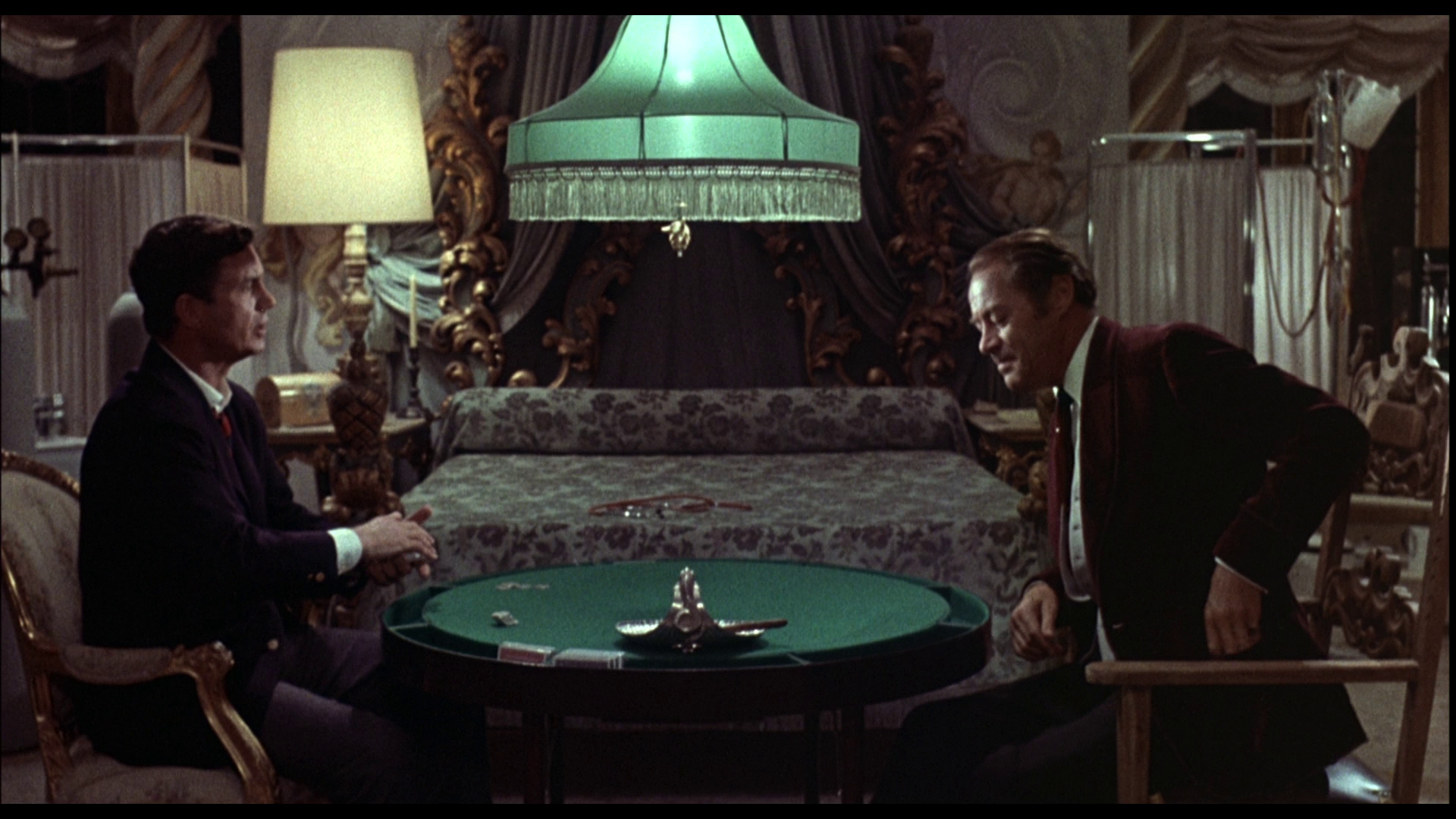 The Honey Pot (Joseph L Mankiewicz, 1967) The Honey Pot (Joseph L Mankiewicz, 1967)
Joseph L Makiewicz’s 1967 picture The Honey Pot has a curious history. The film is based on a 1959 play by Frederick Knott entitled Mr Fox of Venice. That play, in turn, was based on Thomas Sterling’s 1955 novel The Evil of the Day. Sterling’s novel was itself loosely adapted from Ben Jonson’s 1606 play Volpone. The Honey Pot foregrounds its connection to Volpone, making direct reference to Jonson’s play at a number of points in its narrative.
The film begins with the immensely wealthy Cecil Fox (Rex Harrison) watching a private performance of Jonson’s Volpone. Fox unexpectedly interrupts the performance, much to the bemusement of the actors, telling them ‘I know it [the play] well’. At his home, Fox is visited by William McFly (Cliff Robertson), a sometime actor. Fox has a role for McFly, who tells Fox that ‘between engagements [he] does odd jobs. But how odd is this job that you’ve got?’ Fox intends to hire McFly as his ‘stage manager’ for a cruel charade he intends to enact upon three of his former lovers: Princess Dominique (Capucine), Merle McGill (Edie Adams) and Lone Star Sheridan (Susan Hayward). All three women have achieved considerable wealth within their own particular fields.
Fox has told the three women that he is terminally ill and must determine to whom he plans to leave his considerable fortune. The three women arrive at Fox’s home; Sheridan brings with her a timid English nurse, Sarah Watkins (Maggie Smith). The women come bearing gifts for Fox, hoping to win him over; they also seem willing to allow him to seduce them. Fox and McFly’s plan involves staging Fox’s death and allowing the women to sweat over who will be named as Fox’s heir, before revealing that Fox has left his fortune to McFly. However, Fox murders Sheridan – who reveals herself to the others to be Fox’s common-law wife – and makes the murder look like a simple mistake with the medication she has been taking. This attempt to cover up Sheridan’s murder is soon spotted by Sarah, who has been replacing many of Sheridan’s medicines with placebos and therefore quickly deduces that Sheridan’s death could not be owing to accidental consumption of the wrong dosage of those medicines. The death is investigated by a local detective, Inspector Rizzi (Adolfo Celli).
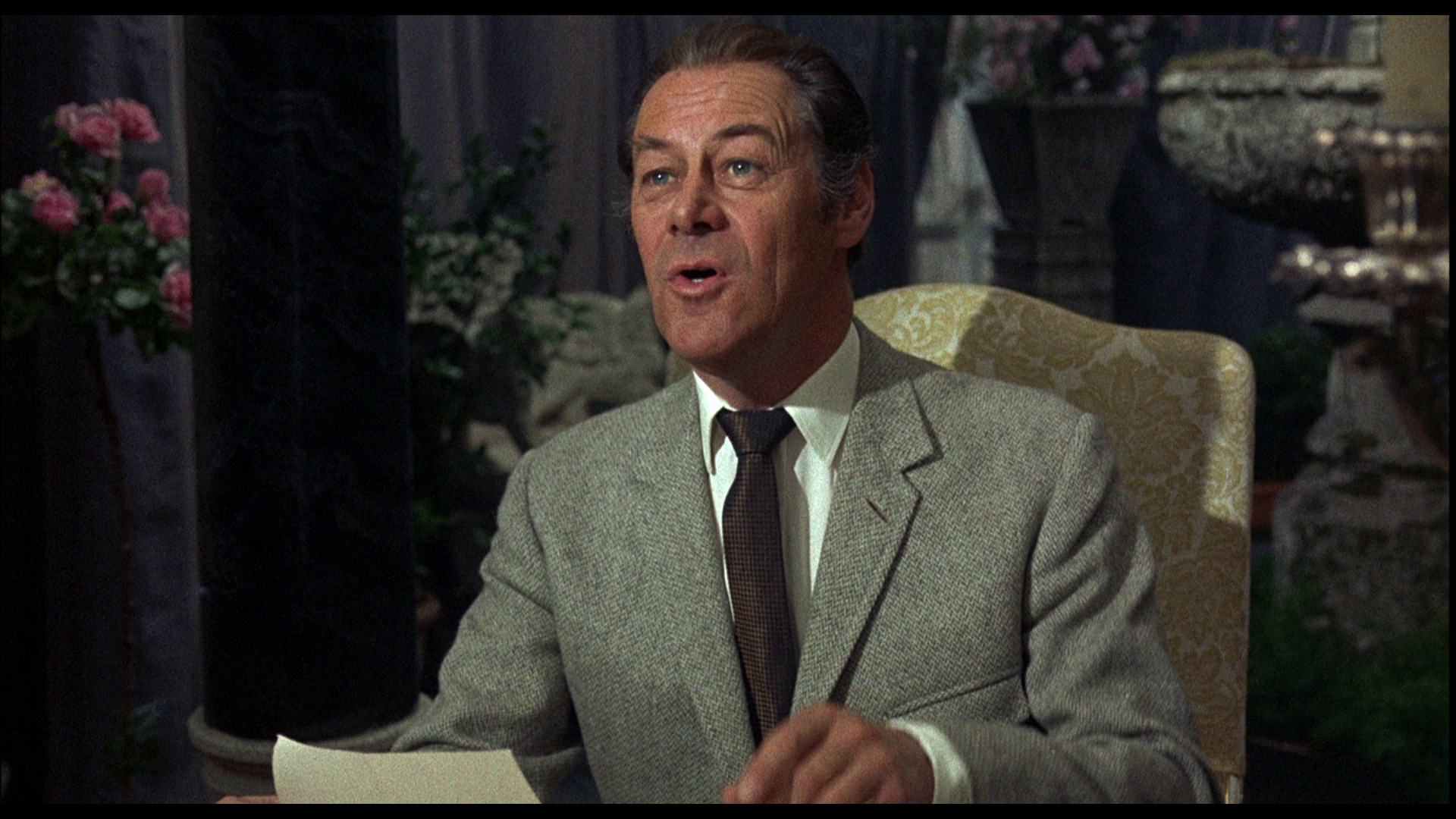 Fox’s plan is built on the premise that people are motivated by greed and a desire for wealth. ‘There’s never enough’, he repeats during his first conversation with McFly, referring of course to money; ‘And refrain, please, from telling me that money can’t buy the beauty of a sunrise or a baby’s smile’. In response to this, McFly says simply that ‘Still, they do say there are some things that aren’t for sale. The souls of men and other intangibles I can’t think of at the moment’. Picking up on McFly’s dry humour, Fox responds jokingly: ‘They’re saying that, are they?’ Fox believes that this greed will convince his victims of his charade, no matter how poor his performance may be. Responding to McFly’s declaration that Fox is a ‘sloppy performer’, Fox declares, ‘My dear McFly, they want to believe I’m dying. I could run a four minute mile around St Mark’s Square and they’d still go right on believing I was dying’. Meanwhile, McFly praises Fox’s own sense of aspiration. ‘You sure reach high for your grapes’, McFly says when he realises what Fox’s plan is and the identities of the three women Fox has invited to the house. ‘The sweetest, they say, hang high beyond ordinary reach’, Fox declares. Fox’s plan is built on the premise that people are motivated by greed and a desire for wealth. ‘There’s never enough’, he repeats during his first conversation with McFly, referring of course to money; ‘And refrain, please, from telling me that money can’t buy the beauty of a sunrise or a baby’s smile’. In response to this, McFly says simply that ‘Still, they do say there are some things that aren’t for sale. The souls of men and other intangibles I can’t think of at the moment’. Picking up on McFly’s dry humour, Fox responds jokingly: ‘They’re saying that, are they?’ Fox believes that this greed will convince his victims of his charade, no matter how poor his performance may be. Responding to McFly’s declaration that Fox is a ‘sloppy performer’, Fox declares, ‘My dear McFly, they want to believe I’m dying. I could run a four minute mile around St Mark’s Square and they’d still go right on believing I was dying’. Meanwhile, McFly praises Fox’s own sense of aspiration. ‘You sure reach high for your grapes’, McFly says when he realises what Fox’s plan is and the identities of the three women Fox has invited to the house. ‘The sweetest, they say, hang high beyond ordinary reach’, Fox declares.
McFly is shocked to discover the theatrical nature of Fox’s plan, and throughout the film reminds us of the ‘staging’ of Fox and McFly’s charade, thus foregrounding the theme of performance in a highly ‘meta’ way. ‘Is there a script?’, McFly asks Fox. ‘I have one in mind’, Fox replies. ‘In a theatre?’, McFlay asks. ‘Righ here’, Fox tells him, ‘It’s a rather intricate joke I want to play on a few old friends’. McFly deduces the similarities between Fox’s plan and Jonson’s Volpone, saying that it ‘doesn’t take a bright actor to recognise Volpone. Even stupid actors dream of playing Mosca, his loyal servant’. ‘Volpone is the better part’, Fox asserts. However, McFly reminds him that ‘In the play, you’ll remember, they both wound up in jail’. It’s Sarah who is the first unwilling participant in Fox’s ‘game’ to realise the connection with Volpone, confronting Fox about the similarities of what is taking place in his house with the events depicted in Jonson’s play and reminding him that volpone is Italian for ‘fox’ mosca is Italian for ‘fly’. She offers a stern counterpoint to the cynicism of Fox’s worldview, telling McFly that ‘If you could understand that everybody in the world can’t want everything or have everything because, well, then everything would be useless’.
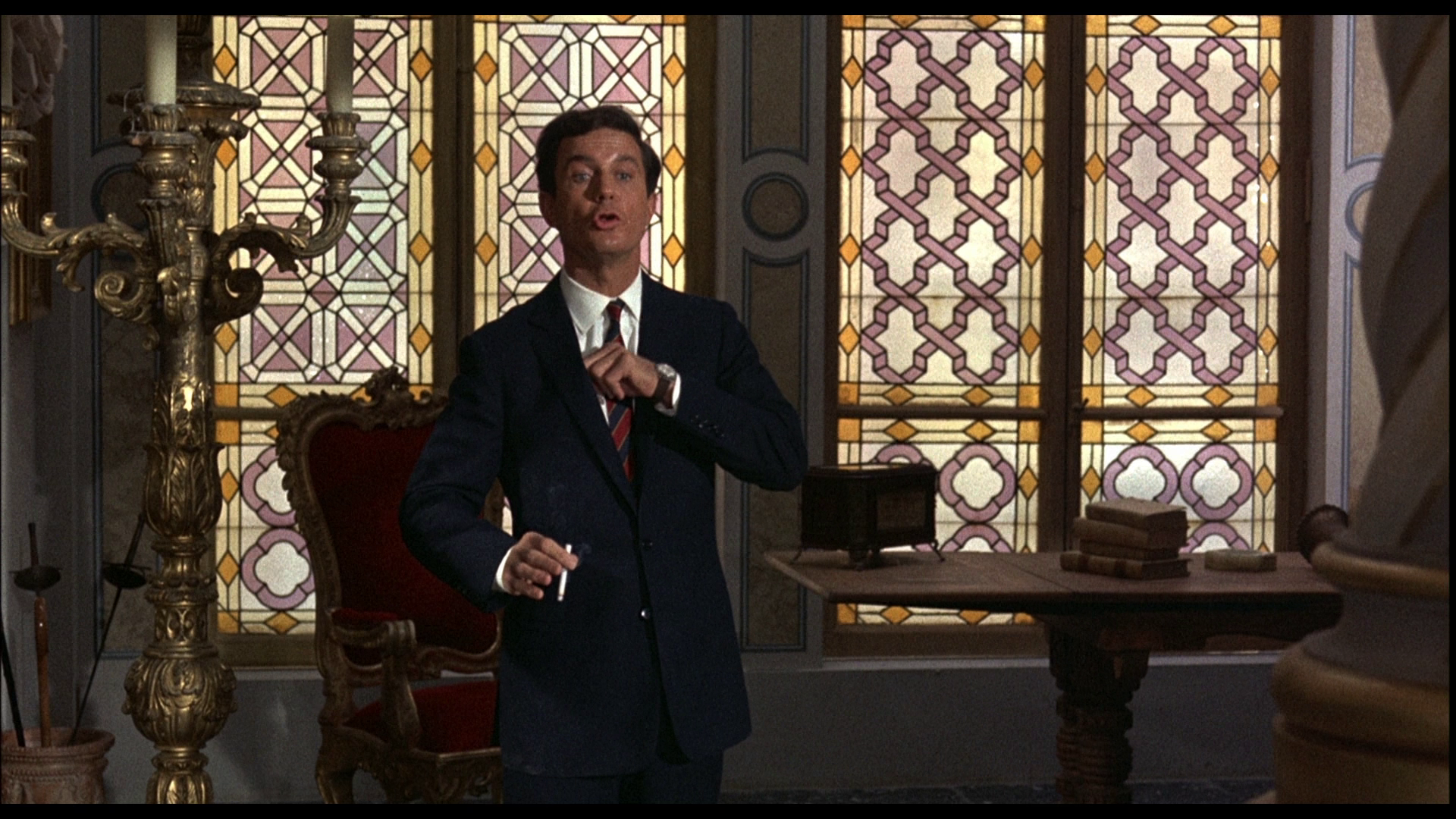 Apparently, Mankiewicz’s first script from the film had featured some deliriously metafictional elements which were eventually removed at the behest of the producers, who thought they would alienate the audience: initial drafts of the film’s screenplay featured characters who were representatives of the Production Code Authority who would ‘show up periodically during the movie itself to delete unacceptable material’ (Harris, 2008: 131). Remembering the original script slightly differently, Mankiewicz himself said in interview that with The Honey Pot, ‘I unfortunately threw away the good script’ (Mankiewicz, quoted in Ciment, 1973: 129). The original script had contained ‘two stories in one: an imaginary part and a modern version of Volpone. In the original story, the film is stopped and the cinema owner comes on the screen to protest that it had become too vulgar, insisting that the film clean up its act. The characters who had not yet appeared on the screen talk to him and ask him to leave so that the film can continue’ (Mankiewicz, quoted in ibid.). Elsewhere in the film, there would have been ‘overlays of memos from the Hays Office condemning certain scenes’ and ‘announc[ing] to parents that in two minutes there would be a scene inappropriate for children and that they should send their children to the bathroom’ (Mankiewicz, quoted in ibid.). Some of these sequences were shot but omitted from the final cut of the picture (ibid.: 130). The resulting film, Mankiewicz admitted, ‘lacks a flavor even if it contains some very good scenes’ (Mankiewicz, quoted in ibid.). Apparently, Mankiewicz’s first script from the film had featured some deliriously metafictional elements which were eventually removed at the behest of the producers, who thought they would alienate the audience: initial drafts of the film’s screenplay featured characters who were representatives of the Production Code Authority who would ‘show up periodically during the movie itself to delete unacceptable material’ (Harris, 2008: 131). Remembering the original script slightly differently, Mankiewicz himself said in interview that with The Honey Pot, ‘I unfortunately threw away the good script’ (Mankiewicz, quoted in Ciment, 1973: 129). The original script had contained ‘two stories in one: an imaginary part and a modern version of Volpone. In the original story, the film is stopped and the cinema owner comes on the screen to protest that it had become too vulgar, insisting that the film clean up its act. The characters who had not yet appeared on the screen talk to him and ask him to leave so that the film can continue’ (Mankiewicz, quoted in ibid.). Elsewhere in the film, there would have been ‘overlays of memos from the Hays Office condemning certain scenes’ and ‘announc[ing] to parents that in two minutes there would be a scene inappropriate for children and that they should send their children to the bathroom’ (Mankiewicz, quoted in ibid.). Some of these sequences were shot but omitted from the final cut of the picture (ibid.: 130). The resulting film, Mankiewicz admitted, ‘lacks a flavor even if it contains some very good scenes’ (Mankiewicz, quoted in ibid.).
At the film’s behest of the producers, Mankiewicz reworked the script into ‘a far more conventional dark comedy’ before production commenced (Harris, op cit.). The film’s production itself was equally troubled, with the film’s first cinematographer being fired by Mankiewicz and his replacement dying whilst production was still taking place. Actress Rachel Roberts attempted suicide too, following an argument with Harrison (ibid.). Mankiewicz’s original intention, according to Cheryl Bray Lower, was to allow the director to ‘vent his frustration about the film business, albeit in the metaphoric disguise of a murder mystery of high comedic proportions’ (Lower, 2001: 119). The name of Harrison’s character, Cecil Fox, alludes to Jonson’s Volpone (the Italian word for a fox) but also suggests ‘a comparison between his title character and 20th Century-Fox or Darryl Zanuck, whose incessant meddling he [Mankiewicz] had to endure throughout the filming of Cleopatra’ (ibid.: 121). The structure of Fox’s plan also mirrored ‘Mankiewicz’s own creative process—from devising a “script” to hiring a “stage manager” (McFly), to casting his stars (Merle, Dominique, and Lone Star)’ (ibid.). Mankiewicz’s belief that life will inevitably get in the way of the most careful planning, something which seems to be borne out in the difficulties faced during the film’s production and the treatment of The Honey Pot itself after its completion, finds its expression in the picture’s final epiphany, a declaration by Cecil Fox (delivered offscreen, in the form of narration) that ‘You know what would be nice? If just once, the bloody script turned out the way we wrote it’.
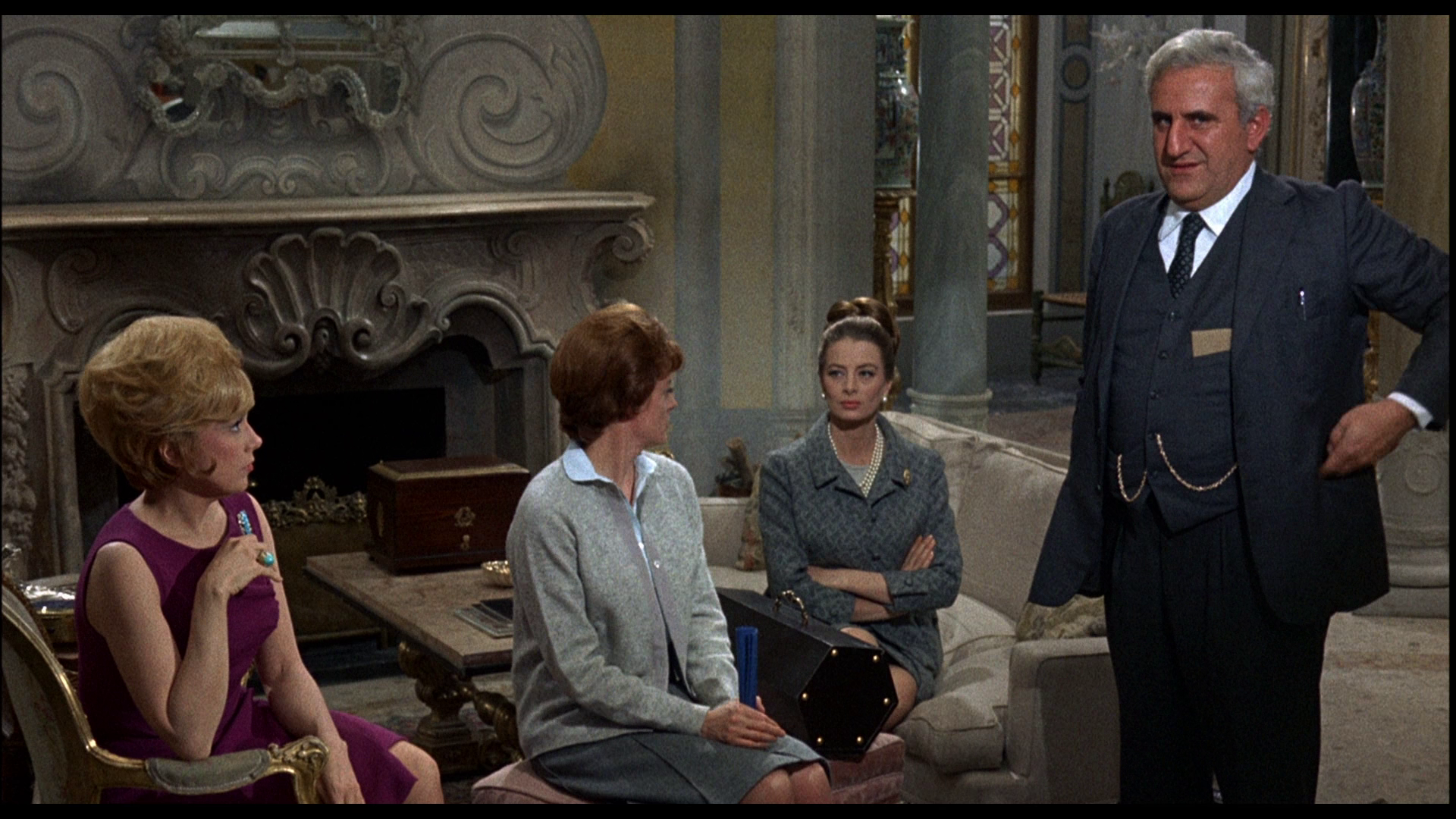 Writing at the time of the film’s original release, Richard Schickel claimed that the joke at the centre of Jonson’s play, that Volpone and his servant Mosca ‘are not merely greedy, they are also miserly’, ‘is entirely lost on Mr Mankiewicz’ (Schickel, 1967: 12). The Honey Pot, Schickel asserted in his review, ‘preserves the original […] conceit’ from Jonson’s original play, but confuses the matter by integrating ‘a wholly unnecessary murder mystery’ into the plot and, as a result, struggling to find a satisfactory resolution before ‘giv[ing] us three conclusions, all softer than the last’ (ibid.). Schickel also suggested that The Honey Pot ‘is under some mysterious compulsion to charm rather than to instruct’, turning ‘the raunchy old reprobate’ Volpone into Rex Harrison’s ‘graceful expert in the art of tasteful consumption’ (ibid.). Mosca, too, is softened in Mankiewicz’s version of the tale, becoming ‘a morally troubled law student, played with all the apple-pie Americanism Cliff Robertson can muster’ (ibid.). Writing at the time of the film’s original release, Richard Schickel claimed that the joke at the centre of Jonson’s play, that Volpone and his servant Mosca ‘are not merely greedy, they are also miserly’, ‘is entirely lost on Mr Mankiewicz’ (Schickel, 1967: 12). The Honey Pot, Schickel asserted in his review, ‘preserves the original […] conceit’ from Jonson’s original play, but confuses the matter by integrating ‘a wholly unnecessary murder mystery’ into the plot and, as a result, struggling to find a satisfactory resolution before ‘giv[ing] us three conclusions, all softer than the last’ (ibid.). Schickel also suggested that The Honey Pot ‘is under some mysterious compulsion to charm rather than to instruct’, turning ‘the raunchy old reprobate’ Volpone into Rex Harrison’s ‘graceful expert in the art of tasteful consumption’ (ibid.). Mosca, too, is softened in Mankiewicz’s version of the tale, becoming ‘a morally troubled law student, played with all the apple-pie Americanism Cliff Robertson can muster’ (ibid.).
The film seems to have been originally released in the UK in a significantly longer variant. The BBFC’s website suggests that the length of the film as classified in 1967 was 150:15 minutes. At some point, the picture was shortened before its US release. Cheryl Bray Lower suggests that what was removed from the film were its flashback sequences. This release from Signal One runs for 131:53 mins, and represents the US cut of the film. To be fair, even at this length the picture seems a little bloated.
Video
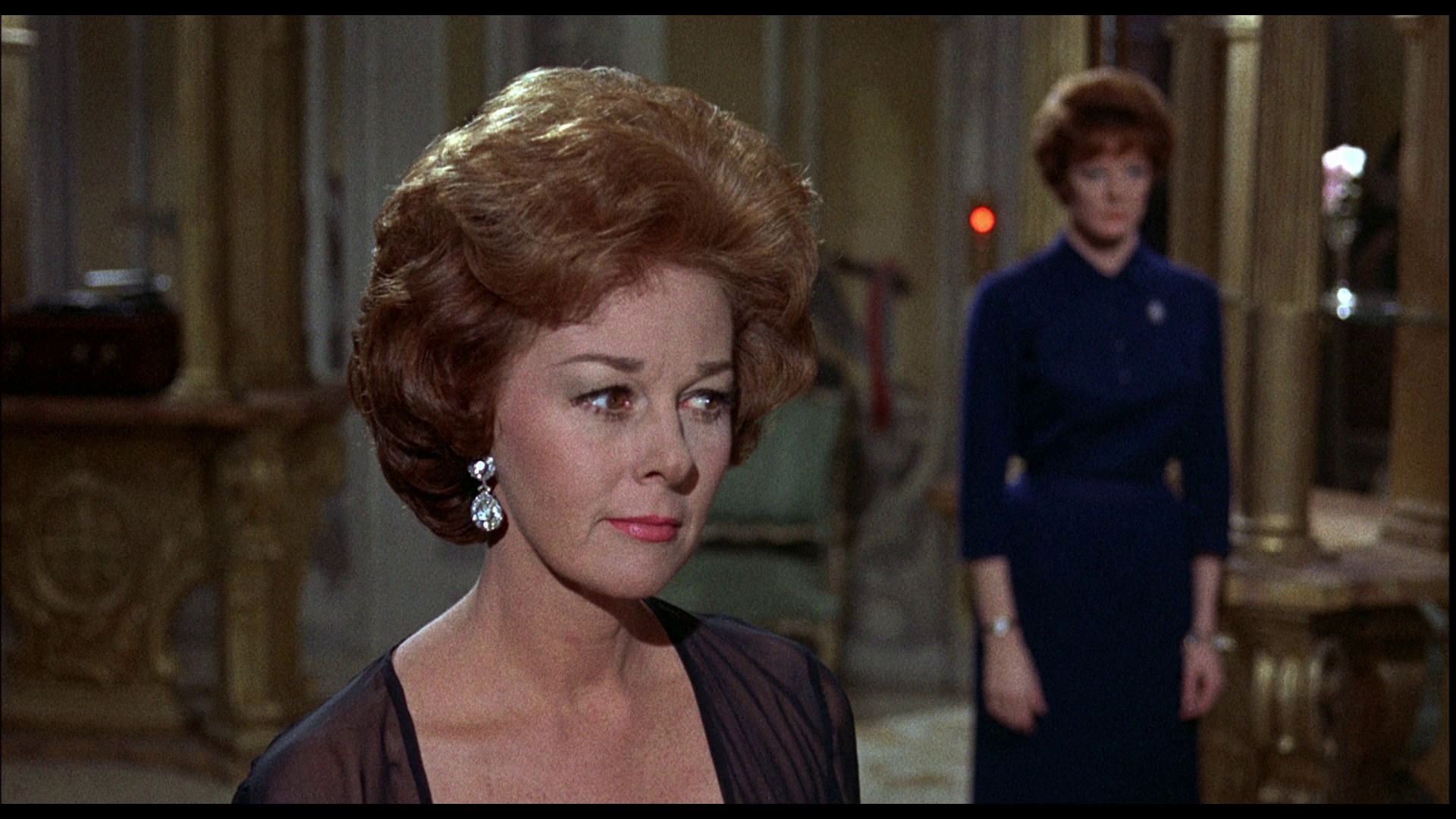 Taking up approximately 20Gb of space on its disc, The Honey Pot is here presented in its original aspect ratio of 1.85:1. The film is presented in 1080p, using the AVC codec. The level of detail on display within the photography is impressive, and is especially noticeable in close-ups of the actors; the colour reproduction is equally impressive. For the most part, the picture has the structure and texture of 35mm film, though some sequences seem to show evidence of digital sharpening and/or edge enhancement. In fact, there’s a very slight inconsistency to some aspects of the image, with some shots here and there evidencing much more damage than others, and other shots displaying a difference in texture. (There are clearly a few shots that have been cropped in postproduction, but a few others seem have been spliced in from a lesser source.) On the whole, it’s a deeply pleasing presentation of the film. Taking up approximately 20Gb of space on its disc, The Honey Pot is here presented in its original aspect ratio of 1.85:1. The film is presented in 1080p, using the AVC codec. The level of detail on display within the photography is impressive, and is especially noticeable in close-ups of the actors; the colour reproduction is equally impressive. For the most part, the picture has the structure and texture of 35mm film, though some sequences seem to show evidence of digital sharpening and/or edge enhancement. In fact, there’s a very slight inconsistency to some aspects of the image, with some shots here and there evidencing much more damage than others, and other shots displaying a difference in texture. (There are clearly a few shots that have been cropped in postproduction, but a few others seem have been spliced in from a lesser source.) On the whole, it’s a deeply pleasing presentation of the film.
NB. Some larger screengrabs are included at the bottom of this review.
Audio
Audio is presented via a LPCM 1.0 mono track, which is accompanied by optional English subtitles for the Hard of Hearing. The LPCM track is clear, rich and dynamic, and the subtitles are grammatically correct and easy to read.
Extras
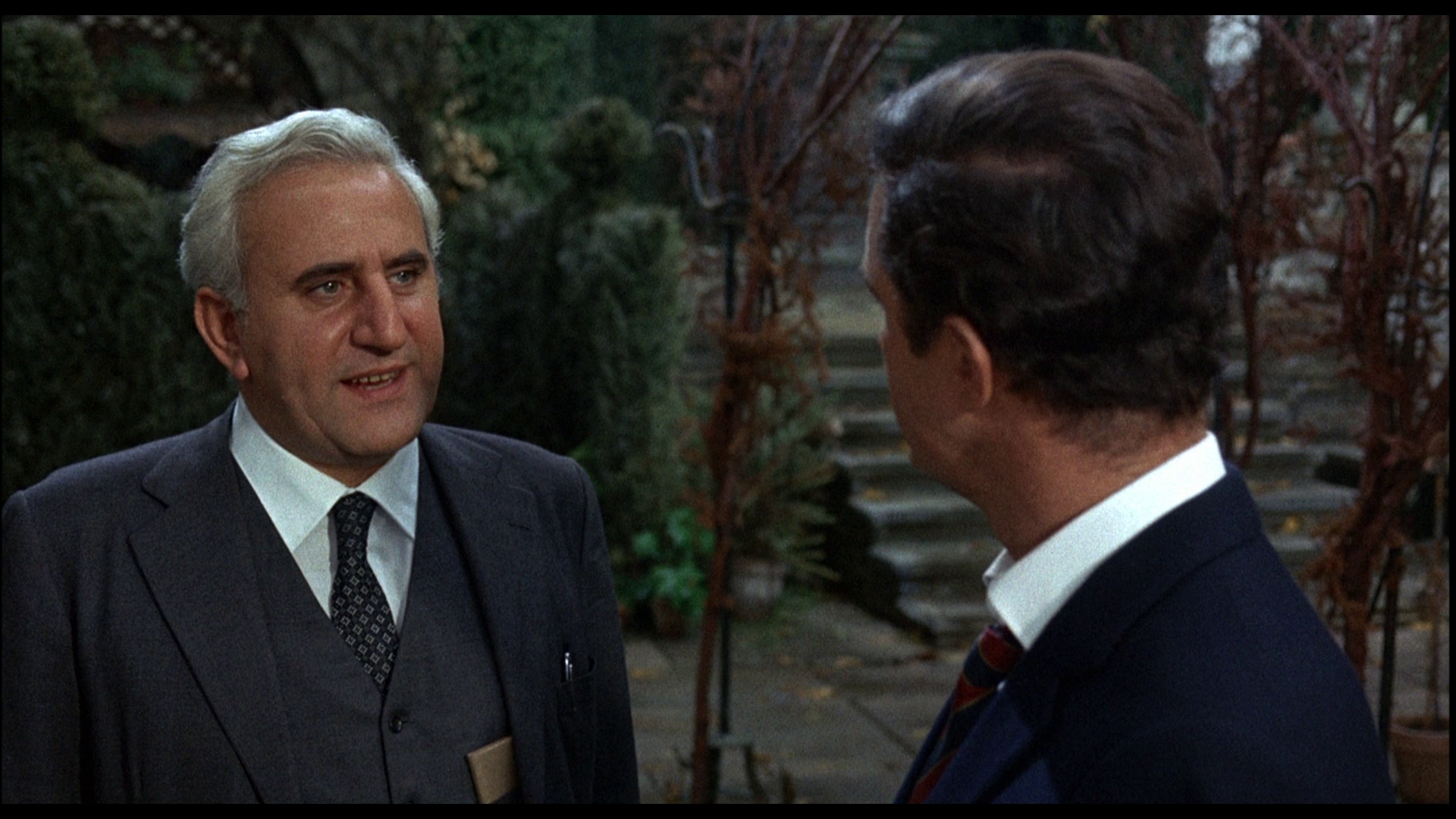 The disc includes two vintage audio interviews, both of which are presented as alternate audio tracks for the main feature and could be said to function as audio commentaries of sorts – though they aren’t listed as such on the packaging or menus. Both interviews were recorded in front of a live audience. The disc includes two vintage audio interviews, both of which are presented as alternate audio tracks for the main feature and could be said to function as audio commentaries of sorts – though they aren’t listed as such on the packaging or menus. Both interviews were recorded in front of a live audience.
- The first is an interview with Rex Harrison recorded at the National Film Theatre in 1971. The interview focuses on Rex Harrison’s career generally. The interview runs for almost ninety minutes.
- The second of these interviews is with Joseph Mankiewicz and was recorded at the National Film Theatre in 1982. Again, this interview focused on Mankiewicz’s work as a director more generally, with some discussion of The Honey Pot alongside Mankiewicz’s other pictures. This interview runs for a little over ninety minutes.
A pressbook and stills gallery (12 images) is included.
Finally, the disc contains the film’s trailer (2:40).
Overall
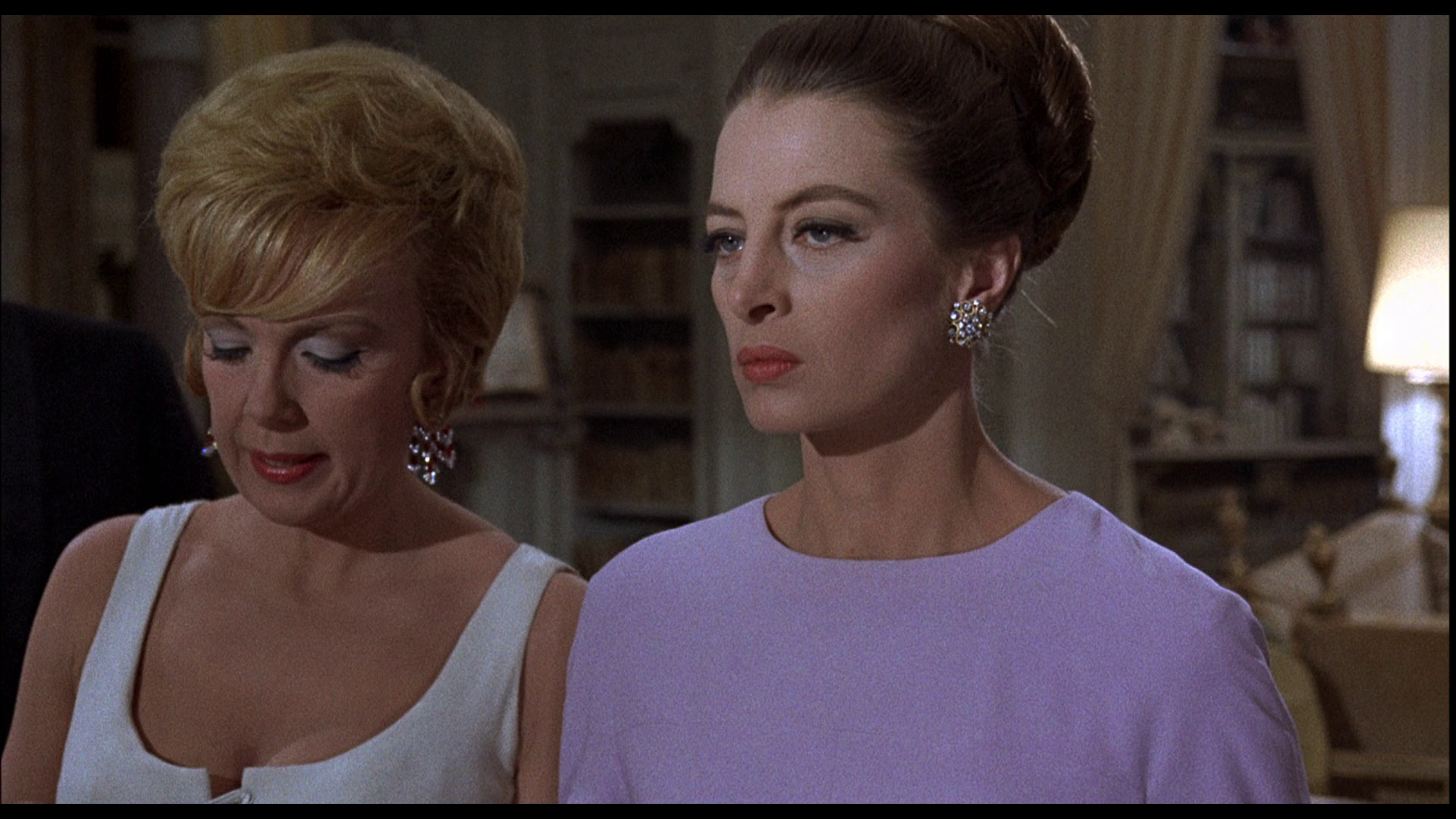 A commercial flop at the time of its original release, The Honey Pot is a compromised picture, with the changes made to it during in both pre- and post-production leaving it with a weak imprint and resulting in a film that often feels rather unfocused. Despite its ostensibly ‘dark’ subject matter, The Honey Pot is a fairly lightweight, entertaining film, though it outstays its welcome slightly. Reviewing the film in 1967, Roger Ebert suggested that if the picture ‘had been a novel and not a film, it would have been one of those leisurely, old-fashioned thrillers John Dickson Carr used to turn out’ (Ebert, 1967: np). (Ebert neglects to mention that the film was a play… and before that a novel… and before that another play.) It’s a fun picture, however, with some good performances from its stars. A commercial flop at the time of its original release, The Honey Pot is a compromised picture, with the changes made to it during in both pre- and post-production leaving it with a weak imprint and resulting in a film that often feels rather unfocused. Despite its ostensibly ‘dark’ subject matter, The Honey Pot is a fairly lightweight, entertaining film, though it outstays its welcome slightly. Reviewing the film in 1967, Roger Ebert suggested that if the picture ‘had been a novel and not a film, it would have been one of those leisurely, old-fashioned thrillers John Dickson Carr used to turn out’ (Ebert, 1967: np). (Ebert neglects to mention that the film was a play… and before that a novel… and before that another play.) It’s a fun picture, however, with some good performances from its stars.
This Blu-ray release from Signal One is very good. The presentation of the main feature is impressive (though as noted above, there seems to be some material patched in from a lesser source, and it’s worth noting that the Blu-ray is of the shorter, and most widely-seen, 132 minute cut of the film). The disc also contains some two very good interviews with Harrison and Mankiewicz which, whilst not focusing specifically on this film, are illuminating in their examination of both artists’ careers.
References:
Ciment, Michel, 1973: ‘An Interview with Joseph L Mankiewicz’. In: Dauth, Brian (ed), 2008: Joseph L Mankiewicz: Interviews. University Press of Mississippi: 125-43
Ebert, Roger, 1967: ‘The Honey Pot’ (review). [Online.] http://www.rogerebert.com/reviews/the-honey-pot-1967
Harris, Mark, 2008: Scenes from a Revolution: The Birth of the New Hollywood. London: Canon Gate
Lower, Cheryl Bray, 2001: ‘The Mankiewicz Woman’. In: Lower, Cheryl Bray & Palmer, R Barton (eds), 2001: Critical Essays with an Associated Bibliography and a Filmography. London: McFarland and Company: 73-124
Schickel, Richard, 1967: ‘A Tart Old Plot Made Too Sweet’. Life (14 July, 1967): 12
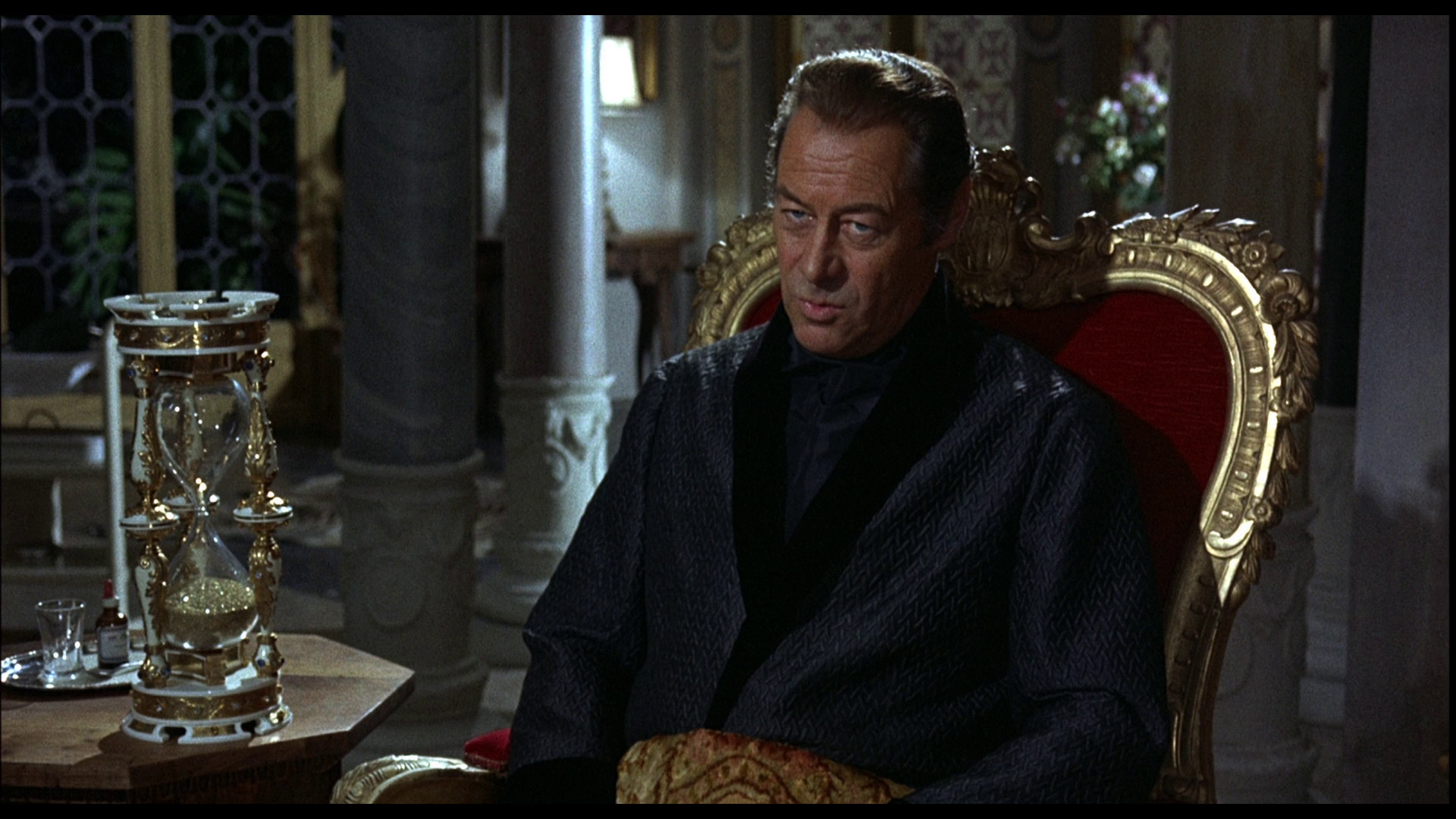
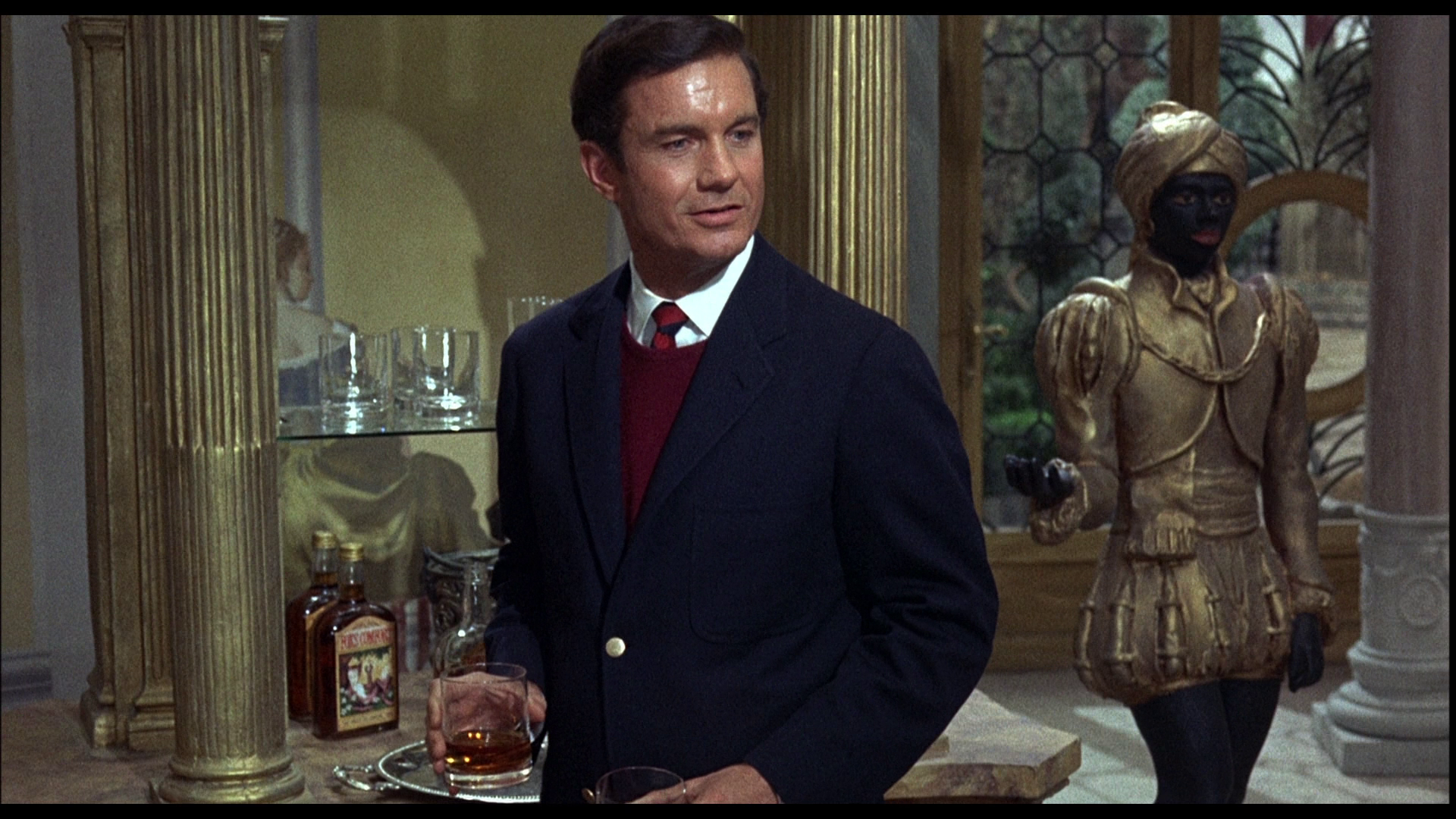
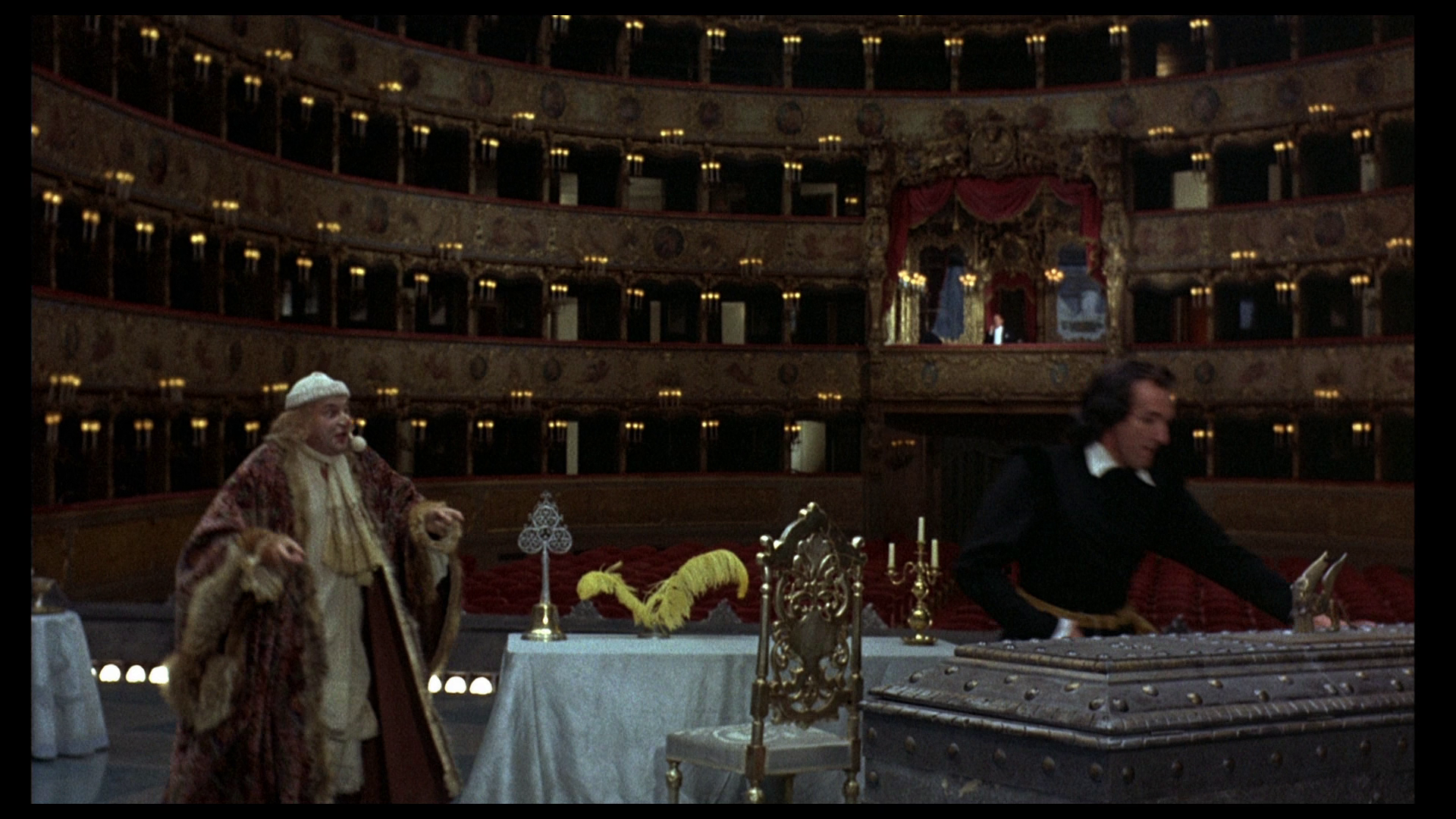
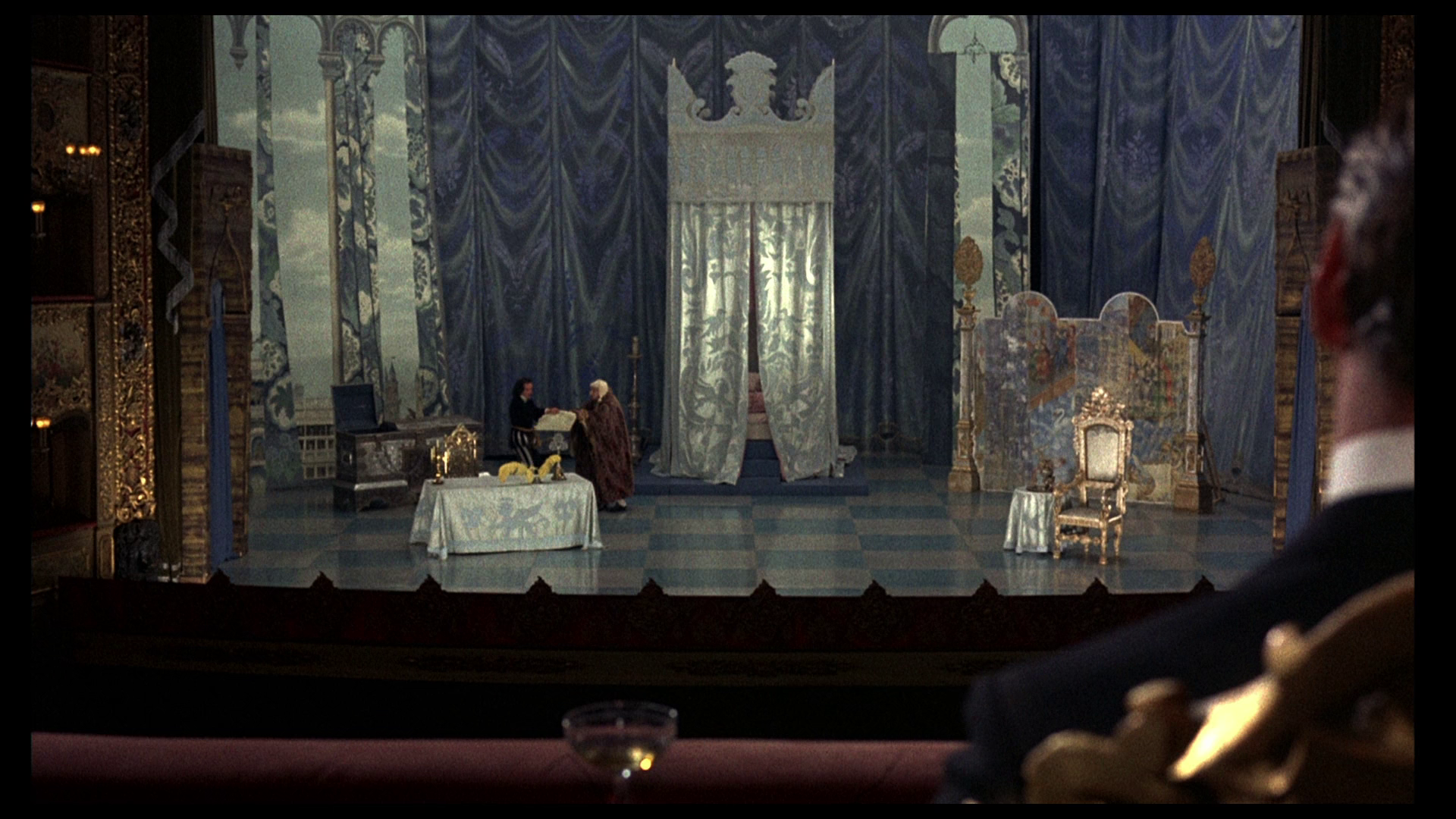
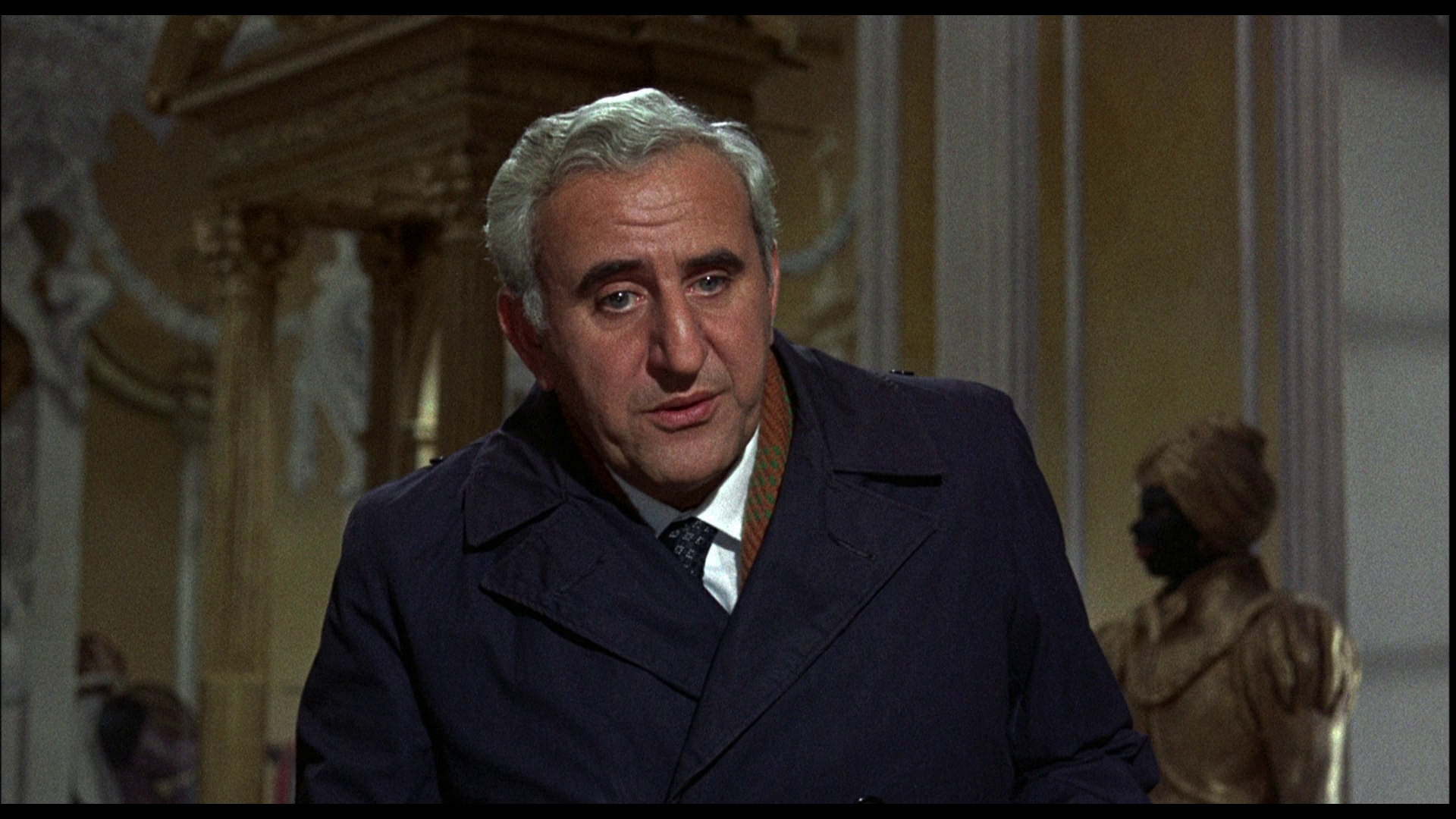
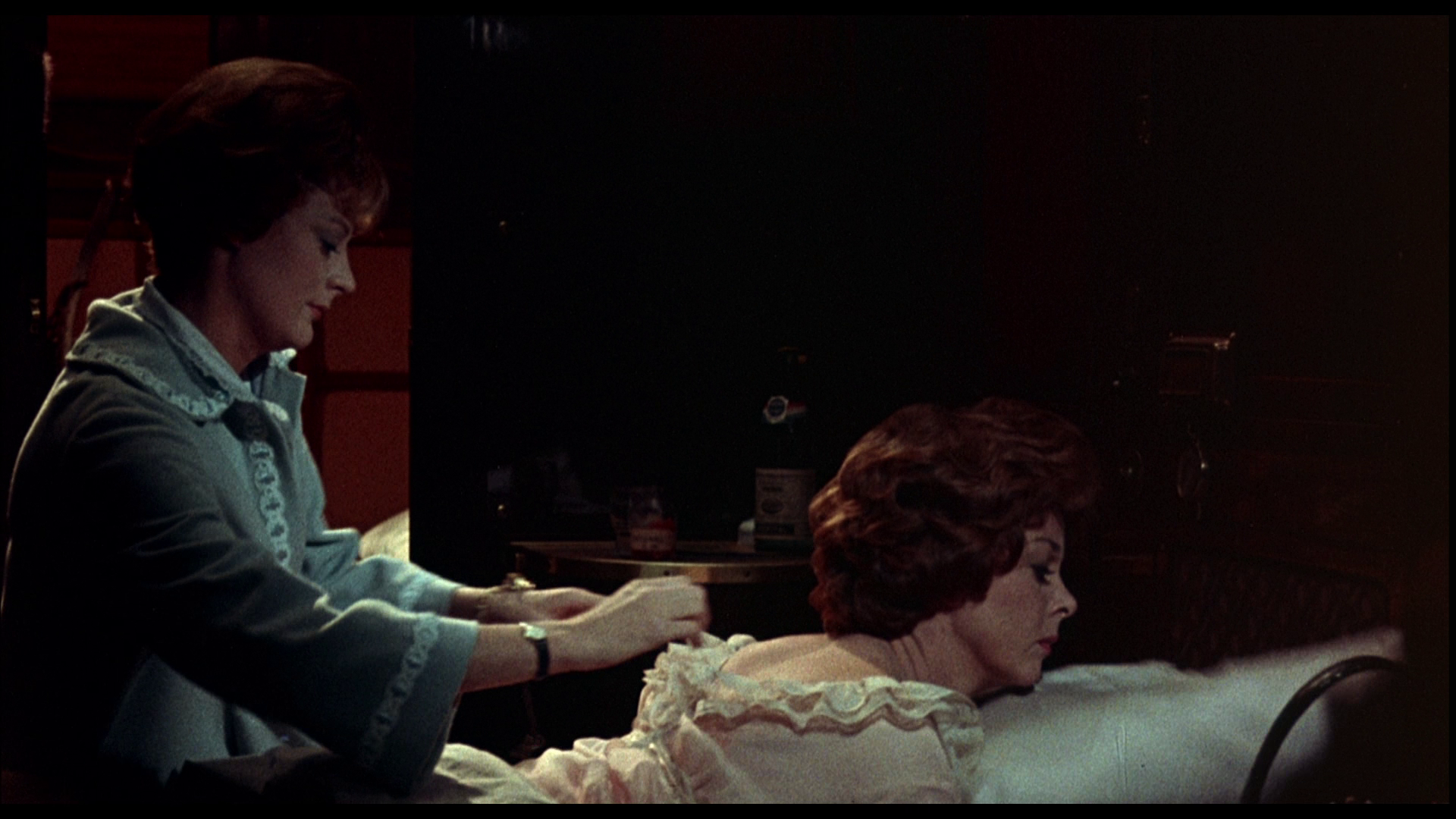
|

